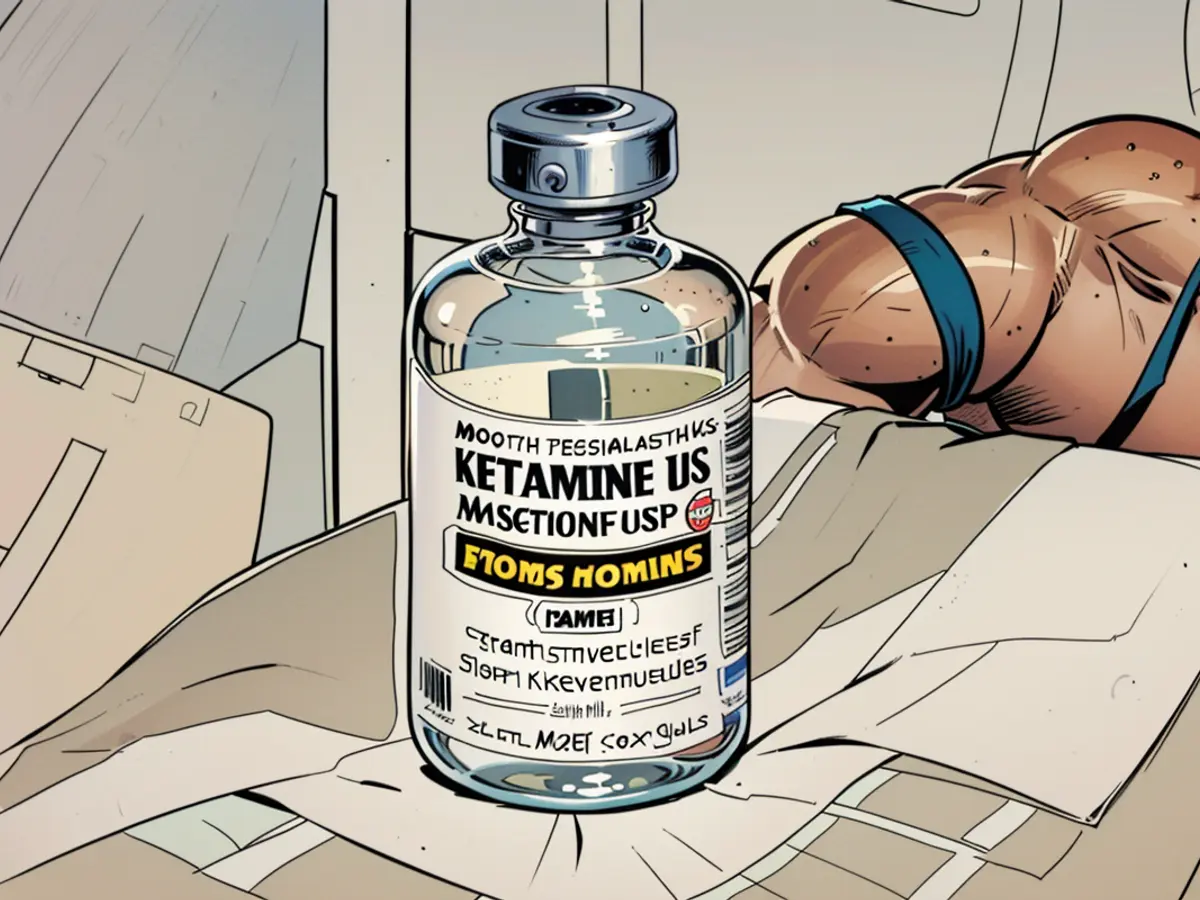Prior to Matthew Perry's demise, professionals had expressed concerns over the unregulated realm of ketamine therapy.
Perry was administrated multiple times the day of his demise, according to the US Attorney's Office for the Central District of California, and an autopsy revealed an excessively high level of ketamine in his system, sufficient for general anesthesia.
The incident has brought light to questionable prescribing practices surrounding ketamine, a hallucinogen with a history dating back decades as an anesthesia. It's also widely recognized for its party uses and more recently, as a potential treatment for depression, PTSD, and chronic pain. Since it's already in circulation, patients seeking relief can access it, occasionally through cash-only clinics with minimal oversight.
Ketamine is classified as a schedule III drug by the US Drug Enforcement Administration, indicating a moderate potential for physical or psychological dependence. This classification imposes limitations on prescription refills and necessitates DEA registration and compliance with certain requirements for dispensing and storage.
Yet, people still find ways to misuse the drug, specifically compounded drugs and generic versions, often diverting it from its intended medical applications.
Doctors are granted leeway to prescribe drugs for uses beyond their original intended purposes, known as "off-label" use. This off-label use usually represents a minority of prescriptions.
In ketamine's case, off-label use of the generic version has skyrocketed, due to the prevalence of cash-only businesses and ketamine's growing reputation as a quick remedy for various ailments.
Dr. Gerard Sanacora, director of the Yale Depression Research Program, opines that there's a need for greater regulation in medical ketamine usage but acknowledges the trade-offs.
"There's this conundrum of how much restriction you should impose, as you don't want to make it more difficult for people to use it as an anesthetic, but concededly, we need some system to monitor its usage outside of medical situations," Sanacora said.
"We're not aware of how many individuals are receiving this drug. We can't determine the doses being used. We don't have information about adverse events."
Ketamine's Growing Enterprise
Official data from the federal government's National Survey on Drug Use and Health suggests that ketamine usage is still uncommon, with approximately 2% of adults reporting lifetime use in 2023.
However, a 2023 study by Epic Research discovered that the rate of ketamine prescriptions in the US increased over 500% between 2017 and 2022, with a substantial majority of prescriptions issued for pain management.
Epic's data covers only traditional medical settings that utilize its medical records system, thus omitting small, cash-only clinics.
Meanwhile, a rise in in-person ketamine clinics has been observed in the US, according to research, providing intravenous infusions, injections, or even oral forms of ketamine, like lozenges, for various ailments. By 2023, the market for ketamine clinics had reportedly surpassed $3.4 billion, with annual growth projected to reach an additional 10% through 2030, according to Grand View Research.
The increased prevalence of telehealth providers started prescribing ketamine therapy online during the Covid-19 isolation period, offering guidance on home usage. Today, online prescribing accounts for nearly half of the market, as reported by Grand View.
In October 2023, the FDA issued a warning about rising compounded ketamine uses, including lozenges, citing psychiatric events, elevated blood pressure, and respiratory depression as potential dangers.
"Ketamine is not FDA approved for the treatment of any psychiatric disorder, and additional clinical studies are necessary to thoroughly explore ketamine’s benefit-risk profile and safe-use conditions in the treatment of psychiatric disorders," the FDA stated.
Dr. Steven P. Cohen, a professor of anesthesiology at Northwestern University's Feinberg School of Medicine, believes some ketamine clinics prioritize profits over patient care.
Cohen said these clinics often forego doctor evaluations for patients, administering doses as high as 35 to 40 milligrams at a time, which in his experience, can be subtherapeutic. Clinics might not monitor patient progress, and patients are expected to pay for each treatment in cash. "It's disheartening. It's a Wild West," he said.
This contrasts sharply with the FDA's strict regulations for the use of esketamine, a derivative of ketamine approved for treatment-resistant depression and available by prescription.*
Ketamine is being promoted to tackle various issues, such as obsessive-compulsive disorder, post-traumatic stress disorder, and generalized anxiety disorder, sometimes before substantial scientific research backs these applications up. As per the autopsy report, actor Perry was utilizing ketamine to combat depression, yet there were indications of a growing reliance on the substance. The US Attorney's Office for the Central District of California revealed in a press release on the charges related to Perry's demise that physicians continued to provide the drug to Perry despite being informed at least a week prior about his escalating ketamine addiction. Perry was candid about his struggles with substance abuse disorder.
Experts claim that ketamine doesn't lead to physical addiction like opioids. Individuals who cease regular usage rarely experience withdrawal symptoms.
"You reside in what I refer to as 'K lands,' 'ketamine lands.' Returning to reality might not be enjoyable, but you won't experience a physical withdrawal, as far as I'm aware. Some people might say it's psychologically addicting," stated Dr. Joseph Palamar, an associate director at New York University's Department of Population Health.
Palamar expresses concern over unsupervised use of the drug at home, particularly in light of situations such as Perry's: the actor drowned in the heated section of his pool after ingesting substantial amounts of the drug, according to the autopsy report.
Subscribe to CNN Health's weekly newsletter
- Click here to receive The Results Are In with Dr. Sanjay Gupta every Tuesday from CNN Health's team.
"It's not the most harmful drug by any means, but it can be harmful when misused," said Palamar, who is also the deputy director of the National Drug Early Warning System (NDEWS), responsible for monitoring early indications of drug epidemics.
Palamar acknowledges that it's challenging to gather data on ketamine-related fatalities but has heard of at least two other instances through NDEWS collaborators.
"Even if you're the most responsible person, ketamine is a scheduled substance that can be dangerous."
In dealing with the drug at home unsupervised, Palamar raises concerns such as cooking while under the influence and inadvertently causing a house fire, or thinking it's safe to drive or go for a walk outside only to get hit by a vehicle.
"All these factors, all these behavioral issues I am worried about because it's unregulated," he said.
Despite its potential benefits for depression and PTSD, the misuse of ketamine can lead to serious health issues. For instance, the FDA issued a warning about compounded ketamine uses due to potential dangers such as psychiatric events, elevated blood pressure, and respiratory depression.
Moreover, unsupervised use of ketamine at home can lead to accidents such as cooking fires, driving under the influence, or even accidents while walking outside. These health risks highlight the need for stricter regulation and oversight in the use of ketamine, even for off-label uses.









